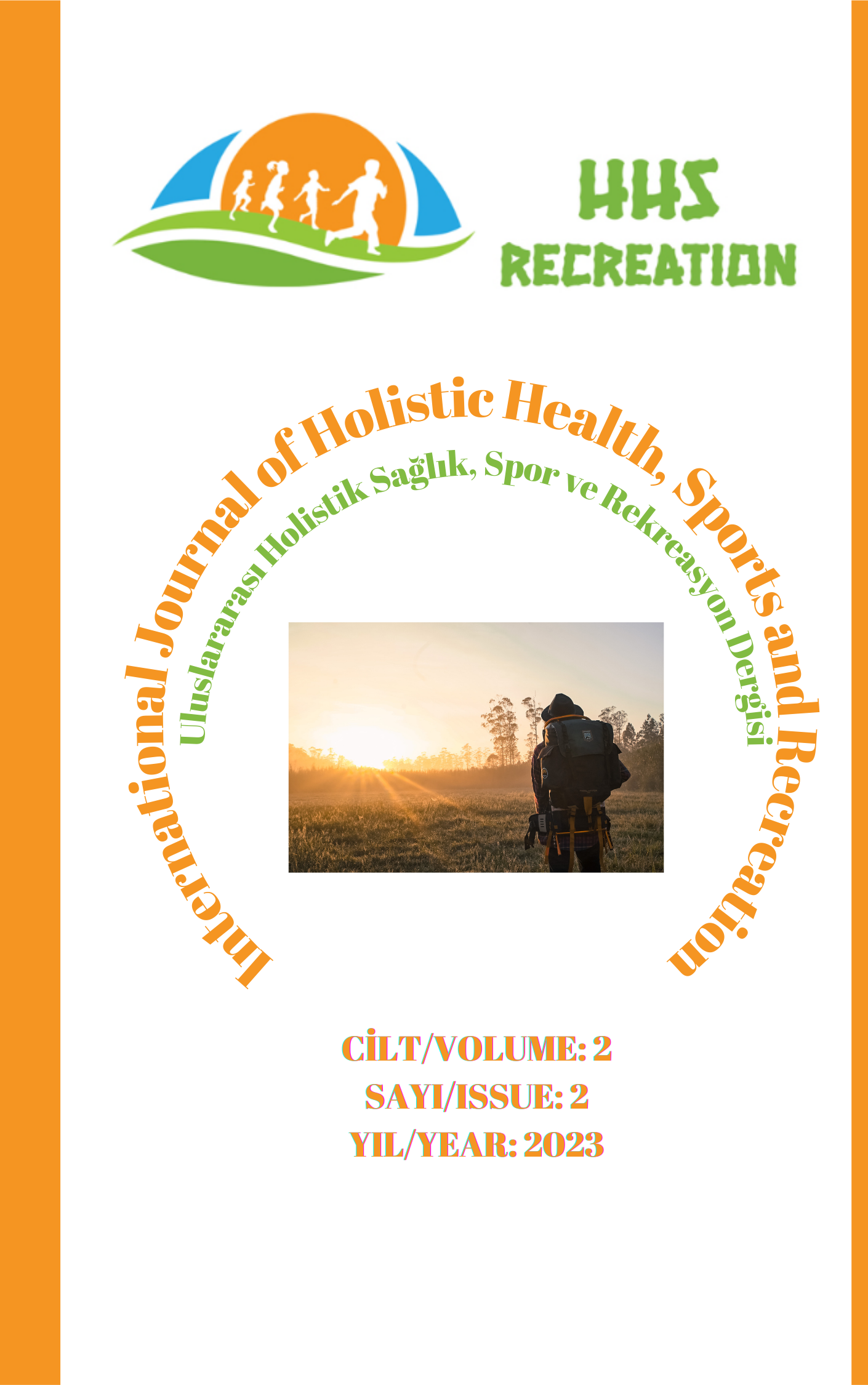Investigation of Recreational Sports Well-Being Levels In Individuals Who Engage In Functional Training
DOI:
https://doi.org/10.5281/zenodo.10327017Keywords:
Functional training, recreation, sports, well-beingAbstract
Functional training is a type of training we do to gain the strength, flexibility and coordination we need in daily activities. Positive effects such as socialization, complete physical and mental well-being, and increased motivation have been observed in individuals who do sports for recreational purposes. The aim of this study is to examine the recreational sports well-being levels of individuals doing functional training in terms of different variables. The sample of the research consists of a total of 114 individuals doing active functional training, 62 of whom are women and 52 of whom are men. Recreational Sports Well-Being Scale (RSSI) was used as a data collection tool. Individuals were asked about demographic characteristics such as gender, age, height, weight, monthly income and sports history. Before analyzing the data, a normality test was performed and it was determined that it did not show a normal distribution. Nonparametric tests, Mann Whitney U test and Kruskal Wallis tests, were used for non-normally distributed data. According to the research findings, while no statistically significant difference could be obtained in variables such as gender, age, height and weight, statistical significance was tested in some sub-dimensions of sports history and monthly income level variables. When we look at the sports history variable, this significance in the Family Relationship Development (AİG) sub-dimension shows that as the individual's sports years increase, family relationships also increase and develop at the same rate. In the individuals' monthly income variable, statistical significance was found in the family relationship development and Positive emotion (PD) sub-dimensions. In this respect, we can say that the development of family relationships and positive mood of individuals with a monthly income are positively affected.
References
Başar, S. (2018). Düzenli egzersizin depresyon, mutluluk ve psikolojik iyi oluş üzerine etkisi. İnönü Üniversitesi Beden Eğitimi ve Spor Bilimleri Dergisi, 5(3), 25-34.
Başoğlu, M. A. (2019). Edirne il merkezinde 15-49 yaş grubu kadınların siberkondrinin sürekli kaygı ve psikolojik iyi oluş ile ilişkisinin incelenmesi.
Boyle, M. (2010). Advances İn Functional Training: Training Techniques For Coaches, Personal Trainers And Athletes. Bookbaby.
Bruno, A., Quattrone, D., Scimeca, G., Cicciarelli, C., Romeo, V. M., Pandolfo, G. and Muscatello, M. R. A. (2014). Unraveling exercise addiction: the role of narcissism and self-esteem. Journal of Addiction, 2014.
Demir, G. T., Namlı, S., Hazar, Z., Türkeli, A., & Cicioğlu, H. İ. (2018). Bireysel ve takım sporcularının karar verme stilleri ve mental iyi oluş düzeyleri. CBÜ Beden Eğitimi ve Spor Bilimleri Dergisi, 13(1), 176-191.
Gümüşay, M., Koç, M. C. & Turhan, M. (2023). Kick Boks sporcularının rekreasyonel spor iyi oluş düzeylerinin incelenmesi. International Sport Science Student Studies Journal, 5(1), 46-59.
Güngörmüş H.A., Yenel F., Gürbüz B. (2014). Examination of Recreational Motives of Individuals: Demographic Differences. International Journal of Human Science, 11(1), 373-386
Güvenç, A. (2021). Beden eğitimi ve spor öğretmenlerinin psikolojik iyi oluş düzeyleri ile olumlu düşünme beceri düzeyleri arasındaki ilişki (Master's thesis, Karamanoğlu Mehmetbey Üniversitesi).
Haddock, C. K., Poston, W. S., Heinrich, K. M., Jahnke, S. A., ve Jitnarin, N. (2016). The Benefits Of High-İntensity Functional Training Fitness Programs For Military Personnel. Military Medicine, 757(11-12), E1508-E1514.
Ilgın, F. (2023). Su sporları yapan ve yapmayan bireylerin öznel iyi oluş ve öfke ifade tarzlarının incelenmesi. Yüksek Lisans Tezi. Selçuk Üniversitesi.
Kılbaş, S. (2005). Rekreasyon boş zamanları değerlendirme. Ankara: Gazi Kitabevi.
Koç, M. C. (2022). Rekreasyonel spor iyi oluş ölçeği (rsioö) türkçe versiyonu: geçerlik ve güvenirlik Çalışması. Journal of Recreation and Tourism Research, 9(4), 86-97.
Kumartaşlı, M., & Atabaş, E. (2015). Spor merkezi fitness salonunu kullanan bireylerin beklentilerinin değerlendirilmesi. International Journal of Sport Culture and Science, 2(Special Issue 1), 898-904.
Lee, I. M., Shiroma, E. J., Lobelo, F., Puska, P., Blair, S. N., Katzmarzyk, P. T. and Lancet Physical Activity Series Working Group. (2012). Effect of physical inactivity on major non-communicable diseases worldwide: an analysis of burden of disease and life expectancy. The lancet, 380(9838), 219-229.
Özden, K. (2014). Üniversite öğrencilerinde psikolojik iyi oluşun psikososyal yordayıcılarının sosyal bilişsel kariyer kuramı açısından incelenmesi (Master's thesis, İstanbul Arel Üniversitesi Sosyal Bilimler Enstitüsü).
Rhodes R.E., Dean R.N. (2009). Understanding physical inactivity: Prediction of four sedentary leisure behaviors. Leisure Sciences, 31(2): 124-135.
Sevil, T. (2012). Boş zaman ve rekreasyon: kavram ve özellikler, boş zaman ve rekreasyon yönetimi. Eskişehir: Anadolu Üniversitesi Yayını.
Sezgin, Y., & Yıldızhan, Y. Ç. (2023). Beden eğitimi ve spor öğretmenlerinin öznel iyi oluş ve duygusal zekâ düzeyleri arasındaki ilişkinin incelenmesi. SPORMETRE Beden Eğitimi ve Spor Bilimleri Dergisi, 21(2), 1-18.
Şahin, M., Civan, A. H., & Köktaş, E. (2023). Kadınlarda 8 haftalık fonksiyonel antrenman programının fiziksel uygunluk parametreleri üzerine etkisinin incelenmesi. İnönü Üniversitesi Beden Eğitimi ve Spor Bilimleri Dergisi, 10(1), 23-31.
Thompson, W. R., Gordon, N. F. and Pescatello, L. S. (2009). ACSM’s guidelines for exercise testing and prescription: Hubsta Ltd 2-5.
Ulaş, T. (2022). Spor yapan bireylerin psikolojik iyi oluş düzeyleri ile zihinsel dayanıklılık düzeyleri arasındaki ilişki (Master's thesis, Karamanoğlu Mehmetbey Üniversitesi).
Downloads
Published
How to Cite
Issue
Section
License
Copyright (c) 2023 International Journal of Holistic Health, Sports and Recreation

This work is licensed under a Creative Commons Attribution 4.0 International License.



